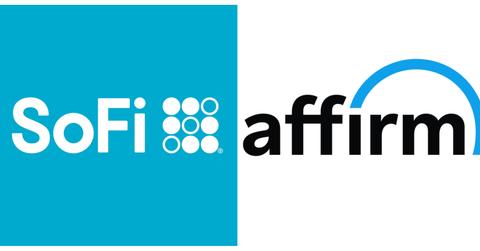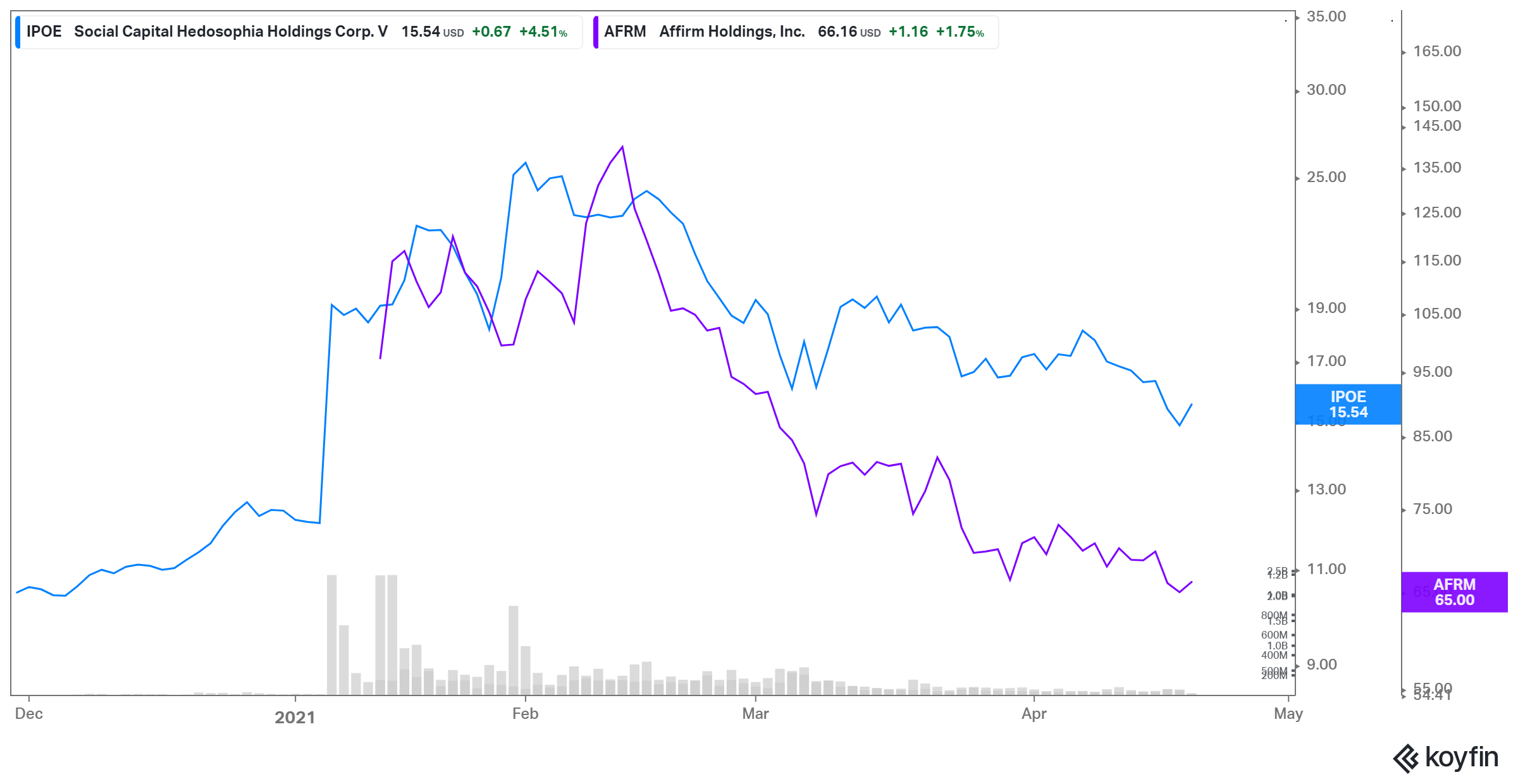Affirm vs. IPOE Merger Target SoFi: Which Is a Better Fintech Stock?
The pullback in fintech stocks has created an opportunity in some of them. Among Affirm and IPOE (SoFi), which is a better fintech stock?
April 21 2021, Published 1:47 p.m. ET

Fintech stocks have remained one of the hottest trends in the market in 2021. Affirm and SoFi— the latter of which will soon go public through a SPAC merger with IPOE—are both well-respected fintech names. Among Affirm and IPOE (SoFi), which is the better fintech investment?
The pandemic accelerated the adoption of digital payments and e-commerce, Last year, as the fintech space took off, venture capitalists started exiting to cash in their positions at the right time.
Why are fintech stocks falling?
Fintech stocks are falling along with most growth-focused stocks as investors rotate toward value stocks. This is an expected market shift given a higher interest rate environment, which will often cause investors to shy away from investments where profitability is further out in the future.

Moreover, investors bid up fintech stocks quite a bit, leading to dizzying valuations for some of these stocks. The changing macroeconomic conditions have provided investors an opportunity to reassess their price-versus-value equations.
Affirm vs. SoFi — two promising fintechs in different spaces.
Affirm and SoFi are both well-respected fintech companies in the U.S. Affirm went public in January 2021 and trades on Nasdaq under the ticker symbol “AFRM.” SoFi, on the other hand, is not yet public but will soon list after the closing of a reverse merger with one of Chamath Palihapitiya’s SPACs, Social Capital Hedosophia Holdings V SPAC (IPOE). While the merger was expected to close in the first quarter, it has surpassed that time frame.
Affirm operates in the buy-now, pay-later (BNPL) domain. It's basically an alternative for consumers to traditional credit cards. This trend is gaining a lot of attention as credit cards charge high fees, late charges, and a few misses could have a negative impact on your credit score. Affirm essentially provides point-of-sale loans to consumers. Through its partnerships with merchants such as Walmart and Shopify, it allows customers to avail loans ranging from three to 36 months. In the process, the company generates interest income.
SoFi offers a wide variety of financial products, including home mortgages, student loans, personal loans, and credit cards. It also has an online brokerage and cash management offering. The company is also counting its acquisition of California-based community bank Golden Pacific Bancorp as the key strategic step towards the company obtaining a national bank charter. A charter would allow it to accept deposits and make loans that use SoFi’s member deposits as opposed to funding its loan offerings as a nonbank.
Through its wide array of services, SoFi aims to create a “financial services productivity loop,” which is about building competitive sustainable advantage. This strategy also results in lower cost and more variable profits and it generates more revenue per member and lowers customer acquisition costs.
But which is the better stock buy: Affirm or SoFi?
Affirm is currently trading at an EV-to-revenue multiple of nearly 24x and 18.6x for 2021 and 2022, respectively. SoFi is not public yet, so, we’ll take IPOE assigned pro forma EV value and adjust it for IPOE’s current market price. Based on that, SoFi’s EV is close to $12.8 billion. This implies an EV to revenue multiple of 13x and 8.6x, respectively for 2021 and 2022. Therefore, as far as valuation is concerned SoFi is trading at almost half of the multiples of Affirm.
The outlook for both Affirm and SoFi remains quite bright. SoFi grew its revenues by 38 percent YoY in 2020 and they are expected to accelerate by 58 percent and 53 percent in 2021 and 2022, respectively. SoFi had 1.85 million members in the fourth quarter of 2020, which should increase to over 3 million in 2021.
Affirm is also significantly expected to grow its top-line. However, Affirm has not started thinking much about profitability yet as its CEO is currently investing for growth. SoFi, on the other hand, expects to be profitable by 2023. If you have to choose one between Affirm and SoFi, SoFi (IPOE) seems like a more attractive bet.

Despite the slump. fintech stocks will recover.
Fintech is the future of the payment and banking industry. The outlook for these stocks looks positive given the fact that millennials seem to prefer them over traditional financial services companies. Last year, JP Morgan even called fintech the “real COVID-19 story,” pointing to “the rise of online start-ups and expansion of digital platforms into credit and payments.” Therefore, there is no doubt that fintech companies have a bright future.
The current pullback in the sector is a part of the bigger rotation in stocks amid higher inflation and interest rates concerns. However, sooner or later, the dust will settle down and investors will come to pick up the beaten down quality fintech names to bet on the digital future. This offers an attractive opportunity for investors to buy quality fintech names for cheap now for long-term returns.
